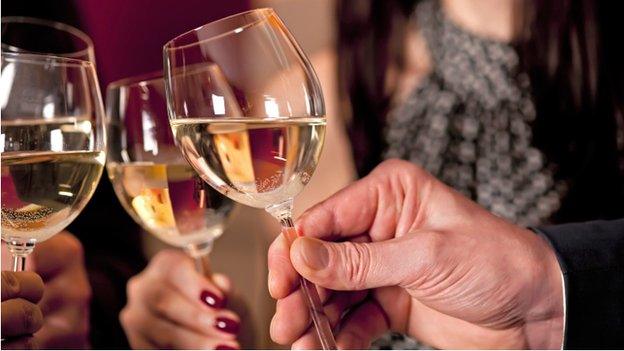Study suggests safe alcohol guidance 'unrealistic'
- Published

Many participants in the study were confused by the concept of alcohol "units"
UK government guidelines on how much alcohol it is safe to drink are unrealistic, largely ignored and should be changed to reflect modern drinking habits, a study has suggested.
Men are currently recommended to drink no more than three or four units a day, and women no more than two or three.
But the study found that the guidelines are largely ignored because most people do not drink every day.
Instead they drink heavily at the weekend - in order to get drunk.
Many people taking part in the research also found the idea of alcohol "units" confusing as they measured their intake in pints, bottles and glasses.
Occasional drinkers
The results suggested that people think the recommended quantities of drink are unrealistic, as they don't recognise that many people are motivated to drink to get drunk.
When participants did regulate their drinking, this was usually down to practical issues such as needing to go to work or having childcare responsibilities, rather than health concerns or due to guidance on safe limits.
Researchers found that participants preferred the current Australian and Canadian guidelines, which include separate advice for regular drinking and for single occasion drinking, which were regarded as more relevant and flexible to occasional drinkers.
Australia recommends drinking no more than four standard sized drinks on one occasion, or two drinks a day.
The study was carried out by researchers from the UK Centre for Tobacco and Alcohol Studies, which includes the universities of Stirling and Sheffield.
'Glass sizes'
They interviewed focus groups in Scotland and the north of England. The results have been published by the Addiction journal, external.
The chief medical officers in both England and Scotland are looking at new guidelines to be published next year, and the researchers have been feeding their results to them.
Prof Linda Bauld of the University of Stirling's Institute for Social Marketing told BBC Scotland that the advice on "safe" alcohol limits was helpful, but needed to be revised.
And she said more emphasis should be put on helping people to drink more sensibly rather than simply telling them what they need to do.
Prof Bauld added: "The Scottish government is trying to push forward with pricing measures, for example, we need to look at marketing, we need to look at glass sizes."